Seoul Dragons | home
League | Nebraska Sun Warriors | Colorado Pioneers | Omaha Wild | Montana Knights | Cincinnati Cyclones | Brooklyn Rage | SLC Fanatics | New York Liberty | Toronto Dinos | Cancun Outlaws | Gabon Giants | London Disco | Rochester Raiders | Sacramento Fighting Cocks | Baltimore Pirates | Carolina Storm | Budapest Tigers | Mexico City Hellcats | Arkansas Stingers | Paris Juggers | Boston Massacre | Andorra Highlanders | Oregon Golden Bears | Miami Xtreme | Capetown Zulu | Albacete Burning Hell | Birmingham Fury | Alaska Snow Bears | Seoul Dragons | Las Vegas Gamblers
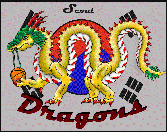
Beginnings on a global stage are never easy. The first steps are often the hardest to take. A hard lesson that fledgling franchises like the Seoul Dragons learn the hard way. Optimism abounds, however, after a season filled with experimentation, for a bright future for the franchise.
Expanding Potential
The Dragons franchise met its first hurdle during the debates for expansion. Initial debate seemed poised to keep the WBA at 28 teams, under the setup with which it had operated since the second season. Representatives of the four finalists to house the new franchise (Seoul, Tokyo, Kyoto, and Sydney) each made their pitches to the WBA's board of directors, presenting materials from the target demographics of each region. When it had been deemed viable, particularly with the travel assistance assured by Nippon Air, the franchise was given permission to scout which of the four locales would be the most suitable.
To ensure that the team would be ready to begin scouting out rookies long before the expansion draft, the coaching staff was put in place by majority owner Andre Dec. Anthony D. (T.D.) Swagger was named the first general manager, and Bill Cash was signed to a two year deal with a third year option to be the first ever head coach. Cash selected his staff after a series of interviews with people he felt would be able to help the young franchise from the beginning.
|
 Head Coach
Bill Cash
|
The coaches for the team under Cash in their first season were:
Arron Black, Head Bench Coach
Charlie Elkington, Assistant Bench Coach
John Felton, Defensive Coach
Marcellus Hoover, Assistant Defensive Coach
Eddie Jacobsen, Strength and Conditioning Coach
Raul Qvevedo, Athletic Trainer
|
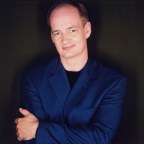 GM T.D. Swagger
|
Initial prospects for the team were optimistic, given their position with the fourteenth overall pick, and college prospects had begun working out for the team before the rest of the roster had been assembled.
Jamsil Arena was the smallest of the four proposed sites, but a conversion to Sang-Am Arena and the potential of opening a franchise where no prior WBA ties had existed led to the selection of Seoul as the home for the new franchise, later to be named the Dragons. Other cities that had petitioned for the franchise, but were rejected for one reason or another included Belo Horizonte, Brazil; Mumbai, India; Hong Kong, PRC; Auckland, New Zealand; Asuncion, Paraguay; Mar del Plata, Argentina; and Brazzaville, Congo.
The Expansion Draft
The draft for both Seoul and their fellow expansion team (the Las Vegas Gamblers) to select their initial eight players provided a number of questions as teams offered a wide variety of players to each team. Young players, legends, journeymen and starters alike faced the possibility of making their debuts in the Dragons colors.
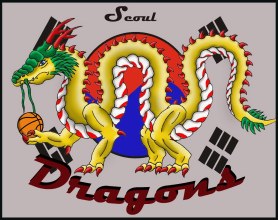 The First Season's Logo
|
Seoul's eyes initially were drawn to Bill Blackstone, a power forward from Toronto who had fallen into a part time role following some health concerns. Averaging nearly 18 points per game for his career, and paired with veteran Joe Siebert, who was drafted with considerations from New York, Blackstone was expected to be a major player for quite some time in Seoul. Other notable players selected in the draft were Abdullah Chanda, John Gaiser, and Evilio Nunez. At the end of the first season, only Siebert remained.
|
“We went a little crazy when it came to trades in the first season.” T.D. Swagger said. “As some players underperformed, and others didn't live up to expectations, we reached out to try to fill the gaps that we perceived early on. Blackstone lasted with us for one game before he went to Charlotte for LaMaitre, Nunez was moved to help us get the money to cover salaries and to bring in Odibe King, Chanda for more draft picks, and so on. We went young, and with that youth, the keys were Siebert, Gaiser, and after we picked him up, LaMaitre teaching the kids what they needed to learn.”
The trades began before the amateur draft, and Seoul's scouting came in handy with six picks.
The Amateur Draft
Seoul's first pick (#14 overall) was just shy of the lottery, and the team had begun to look at how to address future holes-most notably, the ending contract of John Gaiser that would provide the team with almost $8 million in cash, but a huge gap at point guard. Early scouting favored Yoshikazu Tawaraya as their pick, but when he was taken earlier than expected, the team turned to Bohuslav Hruska, a combo guard with good hands and an open eye. The team selected “the center of the future”, Brian Armstrong at #16, and combo guard Jarion Harris at #27. One of their other most highly scouted players, Tyris Mayes, was drafted at #19, which led them to move down in the draft with a trade with Capetown.
“We had a tough decision taken out of our hands at 27 too,” Swagger said, “when Mexico City drafted Ajan Estay far below where he was expected to be picked. Estay had been projected as high as top three by some, and refused to work out for us when we began scouting. Snub like that, we only had other teams' reports about him, and we were still set to take him, maybe. Mexico pulled him off the board and we were able to pick Harris, who we feel has tremendous upside.”
Eiji Yamaha and Ryan DePina, a pair of small forwards, were taken with the first two second round picks for Seoul, and shooting guard Joe Cornell was drafted at number forty-nine overall.
“Both Yamaha and DePina have the tools to be first round picks, and I still see them on the board. Now, during the season, DePina shows he may have a little more than Yamaha here, but then Yamaha steps up and leads him. Both guys have the skills to make it.”
Cornell was traded to London with center Jeff Sandbeck and Evelio Nunez for Odibe King, a future first round pick, and the three million in cash the team needed to offset salaries.
Mister Comeback: Free Agency
Seoul had very little cash and very little influence to parlay on the free agent market in their first season. The most prominent name they were able to sign was a little used center who had played an average of five minutes a game in Boston the season before. Undrafted to start his career, he also spent a full season overseas after his WBA debut when no one had an interest in him. Michael Huryta was as surprised as anyone to see the two year contract at one million per submitted to his agent.
“I didn't figure I had a chance in hell of getting anything more than a part timer's role in the WBA this past season,” Huryta said. “When my agent called me with the offer, I thought it was some colossal joke. I mean, we all heard about the new teams, the new cities, and I knew it meant there were a few more bench spots opening up in the West. So when I was told they actually went LOOKING for me, that they wanted to give me a contract that guaranteed me at least a quarter million a year buyout price, I figured I had enough to build on so I could retire once they realized they didn't need me. But I got in there, I met with Bill Cash, and he made sure that I knew why I was wanted. So I worked hard to make sure I stayed wanted in Seoul.”
|
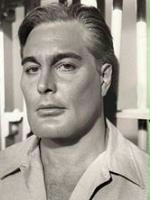 Michael Huryta
|
Huryta fell into the starting power forward role, at 7'1” and 286 lbs, after Bill Blackstone was moved to Charlotte, and proved to be one of the bright spots in the starting lineup for Seoul. Averaging seven and a half boards and nearly eleven points a game, Huryta and Siebert clicked well as teammates and provided an average of nineteen boards a game for the season.
“They called me Mister Comeback,” Huryta said. “I wanted to make sure I won't be forgotten again.”
A Fair Start, a Weak Middle, and Ending Just Short
Seoul won its tenth victory in their 26th game. To some, that number screams inadequacy, but to the fans of the city who sold out the Jamsil Arena for the season before their first home game, it was enough to beg the question of whether the Dragons did indeed have a shot at the playoffs in their first year. Over their next fourteen games, however, they only won four more games, and the team began to truly slump, despite having three future hall of famers on the team.
“We were always short one position player in the end,” Bill Cash said. “When we had a starting center and shooting guard producing, we needed help at point guard. When our point guard was producing, we needed a small forward. It went back and forth like that for the better part of the season, and even after we picked up Daren Benson, we were still in dire need of something bigger and better to keep pushing forward.”
Benson quickly assumed the starting role at point guard, making John Gaiser expendable for teams looking for a little cap relief. Mexico City proved to be the most interested in what he would provide, and Gaiser, Odibe King, and a 2nd round pick were moved in exchange for Angel Rojas, Brody Liang, and a familiar face.
“I couldn't believe Ajan Estay was available.” T.D. Swagger said. “And yet, there he was. And we had a chance to see what he could do in some limited action for us. Next season, he'll see more action, to be sure, and will almost certainly be our shooting guard of the future.”
Despite the team's mounting successes, Angel Rojas fell prey to injury more than once, and Michael Huryta was backed up by Brian Armstrong and James Boone more often than not. Liang, added to the deal for financial reasons, became the default small forward and proved to be moderately successful, especially when it came to passing the ball to the open man.
Seoul decided to build for next season before the trade deadline, moving Eugene LaMaitre to Salt Lake City for combo guard Jalen Bell. And with Bell, the team inched within three and a half games of the #8 playoff spot in the West.
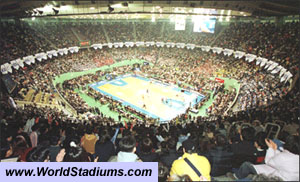 Jamsil Arena, Seoul
|
“We finished short of our goal of thirty wins,” Joe Siebert said. “But not for lack of trying. We were able to beat the first projection we made for ourselves-twenty wins in our first season-and we ended up with a record of 27-53. While that's not a pretty number by any stretch to someone who's been a WBA Champion, the crowds NEVER gave up on us. So we never gave up for them. It might sound kind of hokey, but this is something every player should experience: the chance to play for a city that is always one hundred percent behind you and still believes in you even when things get rough.”
|
The Future: It's All About Seoul
As cap space expands to 75% for the Dragons' second season, the team is pushing for a more aggressive goal. With a young core featuring developing talents Daren Benson, Ajan Estay, Brian Armstrong, Ryan DePina, and Eiji Yamaha as well as veteran players like Joe Siebert, Sam Plummer, and Michael Huryta ready to guide them, there's only one direction the Dragon's are looking to move: up.
”I want to get to the playoffs,” Benson said. “What it comes down to is all of us feel ready to start making that push, whether the rest of the league is ready for us or not.”
“It's been a great half year,” Brody Liang said. “And over here, we're all kind of like instant celebrities. I haven't been part of a team that had such support from their community or done as much for their community as the Dragons.”
Seoul's management has kept the team active in local affairs and charities, working closely with the 100 Won Miracle campaign, as well as Aeranwon and SOS Children's Village in Korea, as well as assisting former player Abdullah Chanda in his charity work in India.
“It's key that we remember that the people who come to see us look up to us, win or lose, as part of the community. It's a different style of life that requires the best of us, even when we struggle, and the team has responded admirably from day one.” T.D. Swagger said.
One of the more intriguing developments as the team is lottery bound for next year is the purchase of ten percent ownership of the team by “Cowboy” Johnny Trammell, an underwear magnate from Dallas best known for his interest in purchasing the Texas Juggers several seasons ago. Lurking on the fringes after the current Paris owner's bid was accepted, the man whose advertising slogans include "Show her you have something special inside your pants" and "The most fun you've had in your pants since prom night" has been following Seoul for the full season and has courtside seats reserved for the coming season at all Dragon games, home and away.
The colorful personality summed up his hopes with the following statement:
”When we're done here, it'll be the rootin'ist, tootin'ist basketball team in the history of tarnation!"
|
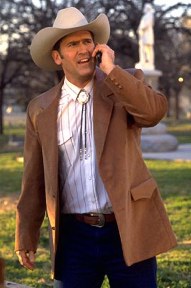 “Cowboy” Johnny Trammell
|